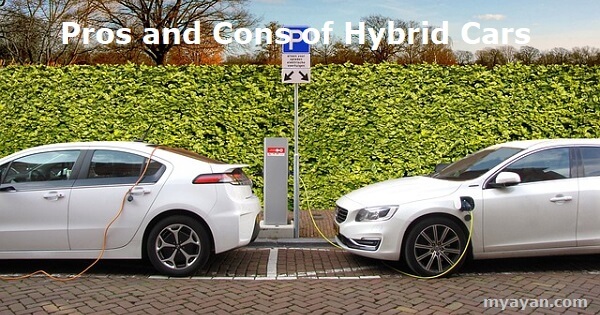You know it, right? People are switching from gasoline to EVs and hybrid cars; and that too, for good reasons. Sustainable transportation has become a priority, and hybrid vehicles are becoming the go-to options one of the options available. These cars use both gasoline and electric power. But there needs to be more clarity among car buyers these days. Is buying a hybrid car a good investment for you? Let’s discuss the pros and cons of hybrid cars to help you decide whether it's the right investment or not.
Going green is the new normal in today’s world. Not just the environment, there are certain advantages of hybrid cars to users as well. These include:
Hybrid cars have a better fuel economy than their gas or diesel counterparts. You can save money on fuel costs, which eventually means, a reduced carbon footprint. HVs are a good option to reduce fuel consumption as they combine electric power with petrol or diesel.
If you want to reduce your Carbon footprint, buying a hybrid car is an excellent choice. It produces fewer emissions than standard gas-powered cars. Alternative Fuels Data Center states that certain all-electric and plug-in hybrid vehicles are eligible for a federal tax credit ranging from $2,500 to $7,500. Many states in the US offer additional incentives for buying new EVs/HVs.
Hybrid cars are typically more powerful and efficient than traditional gas-powered ones. The combination of gasoline and electric motors boosts acceleration, allowing the car to climb hills or accelerate quickly without using as much fuel. This improved performance can also increase the overall lifespan of the vehicle.
Hybrids are to use electricity and gasoline to improve fuel efficiency. When compared with a conventional gas-powered vehicle, HVs typically offer up to 60% better fuel efficiency ratings depending on the model. An efficient car directly helps you have more substantial savings at the pump over time.
Hybrid cars are more cost-efficient than electric cars, so they have become more popular. Compared to fully electric cars, hybrid ones generally have a lower initial cost when buying a vehicle.
Hybrids often qualify for tax credits which can reduce the initial cost of buying the vehicle. That’s how they become a smart choice for people who want an environmentally friendly option without spending too much money.
Despite what people believe, hybrid cars have just as much power as regular cars and can easily handle mountain driving or towing. There are some disadvantages of hybrid cars that you may face depending on the type of fuel your car requires.
Hybrid cars, especially luxury models, often have a higher initial cost than traditional gasoline vehicles. If you consider long-term cost savings in terms of fuel costs, a hybrid car is definitely a better purchase. But, it can be difficult to justify the higher initial cost, if you are on a limited budget or don't expect to drive much.
Hybrid cars may require specialized care when it comes to maintenance and repairs. This can mean higher costs for parts, as well as labor. If you plan to use public charging stations, ensuring your car is compatible with those systems is important. Depending on usage, hybrid batteries typically last between 6 to 10 years and must be replaced when damaged or worn out.
Finding a refueling station for hybrid cars can be challenging due to its limited availability compared to gas stations. Hence, it could be troublesome when planning long road trips or renting a classic car for traveling long distances.
Hybrid cars have a greater chance of experiencing technological malfunctions because they use both traditional and new technologies. Furthermore, some drivers may need help comprehending the complex technology in these cars.
To optimize the resale value of hybrid cars, staying consistent with maintenance and repairs is crucial, as the depreciation of batteries and other components has contributed to a faster drop in value compared to regular cars.
Electric and hybrid vehicles have a limited range compared to gas-powered vehicles. They can cause range anxiety, especially if you live in a rural area with limited access to charging stations or plan long trips.
Conclusion
To determine if a hybrid car is suitable for you, it's important to consider beyond wanting to be eco-friendly. You need to examine the local resources available to support the maintenance and sustainability of the vehicle. To ensure that your car is properly serviced, find mechanics knowledgeable about its specific characteristics or any alternative fuel systems. Additionally, it's a good idea to research any available discounts or credits that could help decrease the overall cost of your vehicle.

It is predicted that hybrids will have a longer lifespan than regular vehicles with internal combustion engines. The reason is that hybrids have both regenerative batteries and a fuel engine that are used proportionally less, which results in a longer lifespan for both components.
Although hybrids are more efficient than traditional ICE vehicles, they are not as efficient as pure electric vehicles (also known as BEVs). Unlike hybrids, BEVs are simple and do not have any added complexity.
Hybrid cars have better fuel efficiency compared to gas cars because they can use both gas and electric motors during operation. Choosing to buy a hybrid car can help you save on fuel costs and reduce emissions, all while still benefiting from the range of capabilities of a gas car.
If drive about 10,000 miles per year, the standard hybrid battery should last for about 10 years. This means it should still be working when you start considering getting a new vehicle after a decade of ownership.